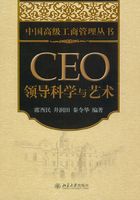
练习与思考
1.举例说明文化对人们观念或行为的影响;如果自己是一位领导者,在工作中应如何诱导或利用这种文化的差异性影响。
2.京东方为什么采用收购而非合资方式进入韩国TFT-LCD业务市场?这样的收购方式有什么样的潜在风险?
正文参考文献:
[1] 刘璞、井润田:“中外合资企业的跨文化冲突研究”, 《管理学报》,2006年第3期第1卷,第113—116页。
[2] 罗昆泉:“自己建庙,洋人念经”, 《财经界:管理学家》,2008年第1期,第18页。
[3] 杨泉:“跨国企业中跨文化管理”, 《中国人力资源开发》,2002年第3期,第22—24页。
[4] 张红玲:“中西文化冲突下的管理”, 《中外企业文化》,2000年第14期,第50—51页。
[5] 张一弛:“我国两岸三地对美直接投资的进入模式:一项基于数据的分析报告”, 《管理世界》,2003年第10期,第33—39页。
[6] Aulakh, Kotabe and Sahay, “Trust and Performance in Cross-border Marketing Partnerships”, Journal of International Business Studies,1996,27(5),1005—1032.
[7] Awadzi W., “Performance Implications of Locus of Control and Complementary Resources in International Joint Ventures: An Empirical Study”, Academy ofInternational Business Conference, London,1987.
[8] Buckley P.J.and Casson M., “Models of the Multinational Enterprise”, Journal ofInternational Business Studies,1998,29(1),21—44.
[9] Dunning J.H., “The Eclectic Paradigm of International Production: A Restatement and Some Possible Extensions”, Journal ofInternational Business Studies,1988,19(1),1—31.
[10] Dunning, J.H., “Toward an Eclectic Theory of International Production: Some Empirical Tests”, Journal ofInternational Business Studies,1980,11(1),9—31.